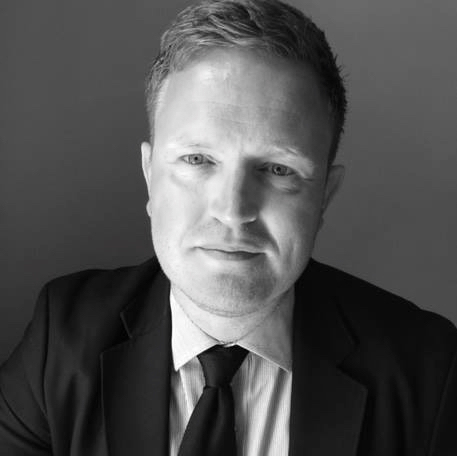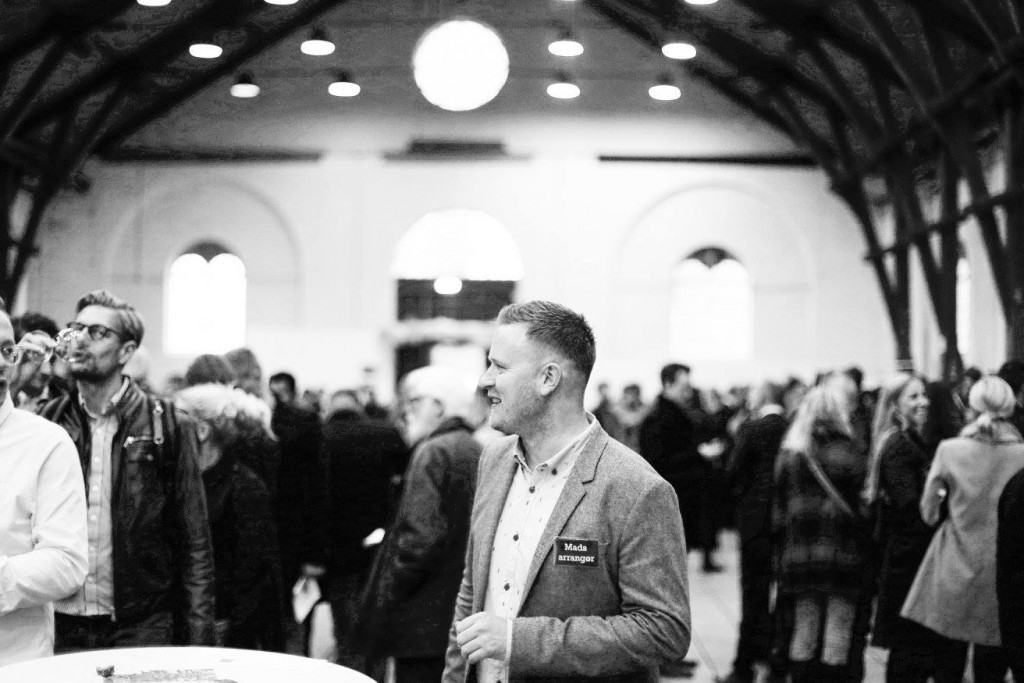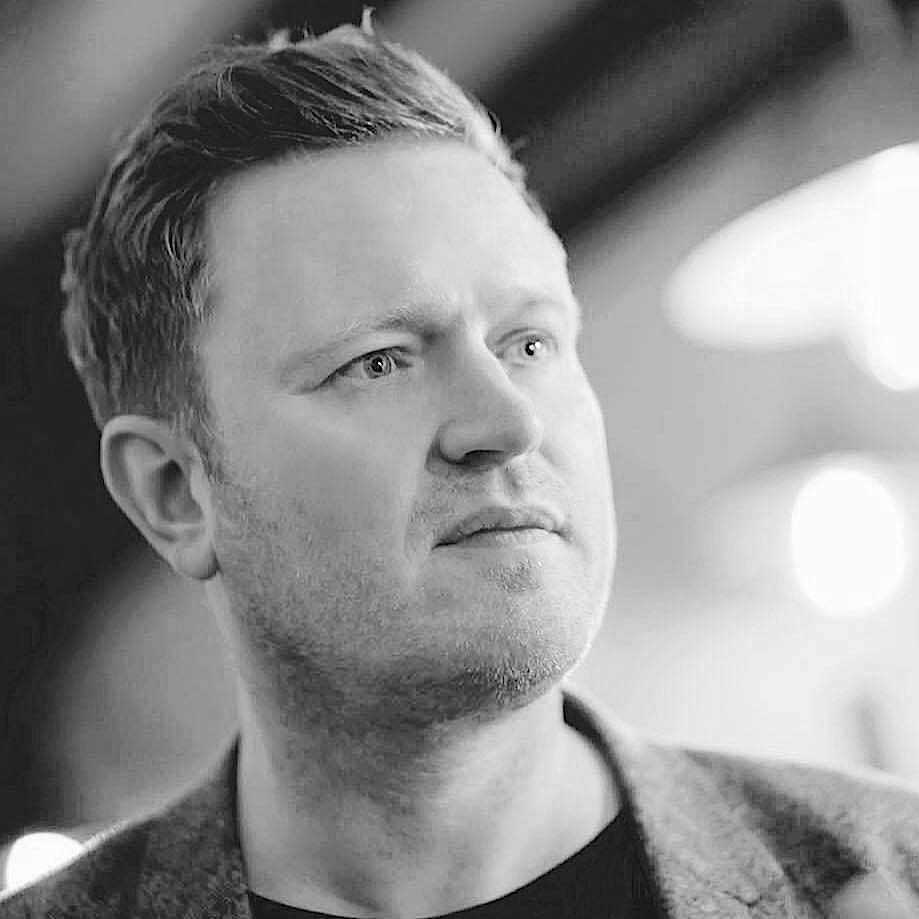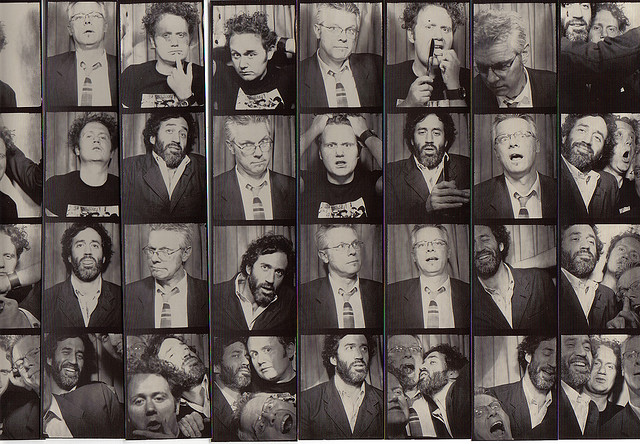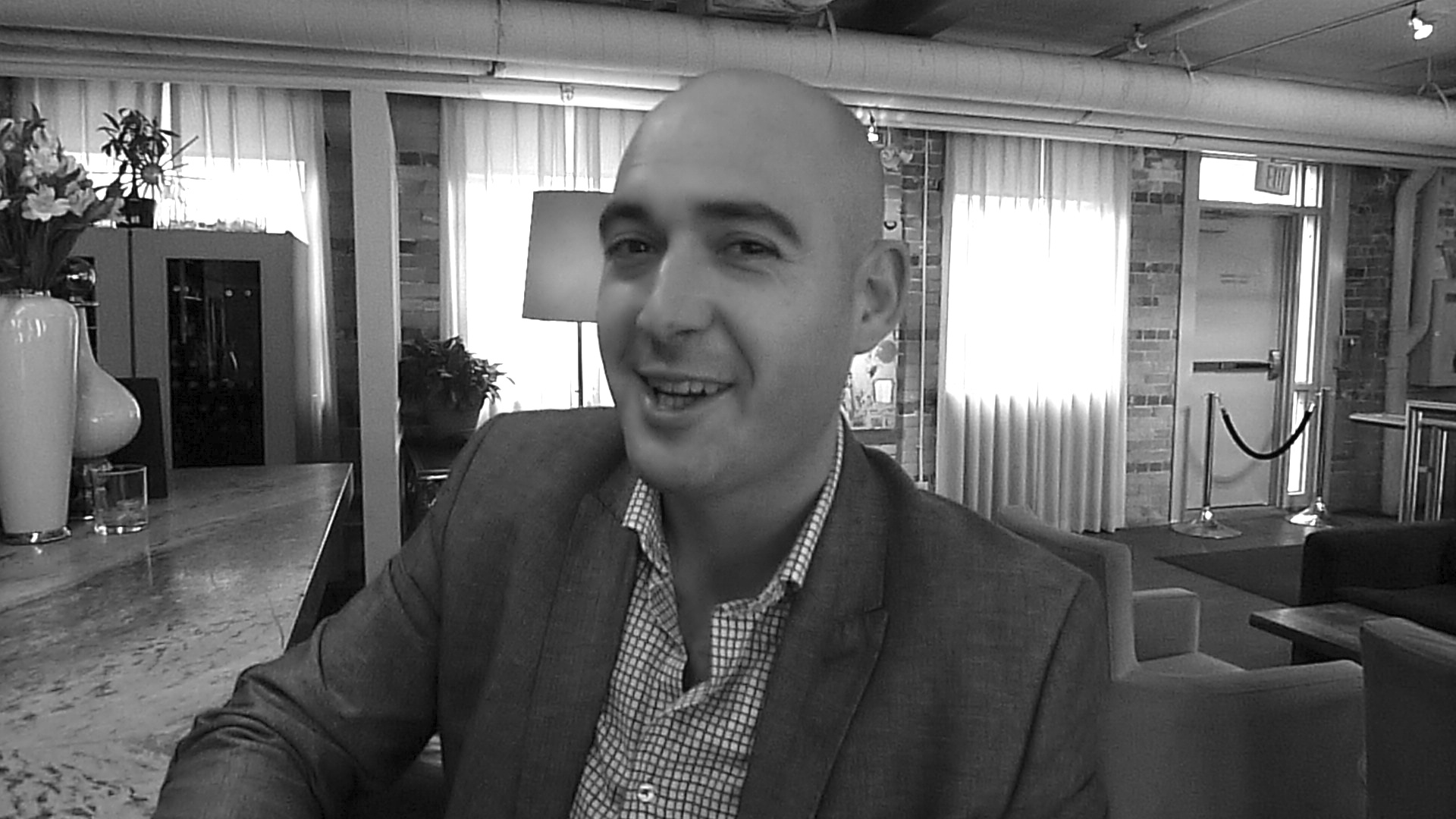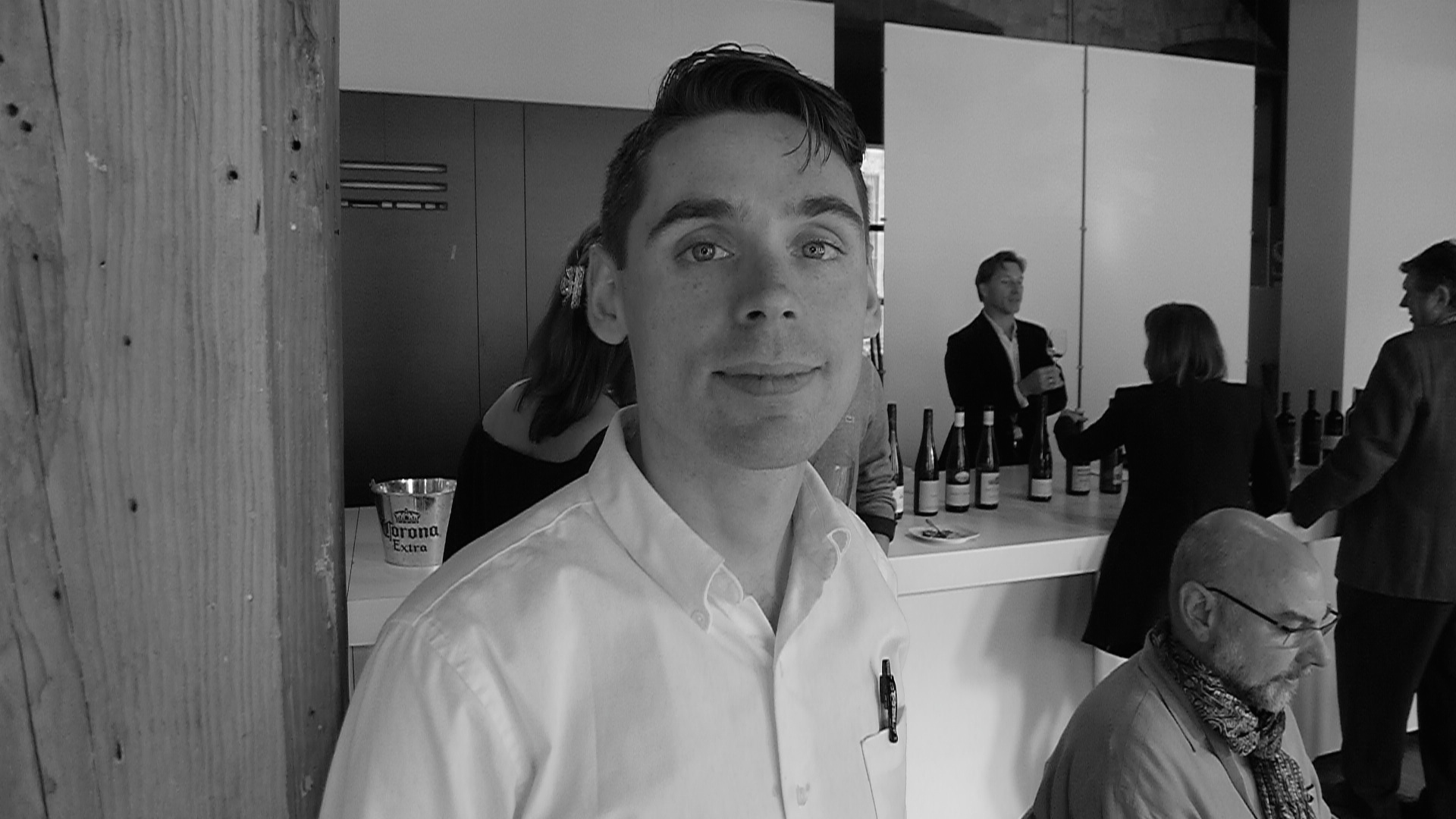In the first of an thirteenth (and wildly popular) series, we interview some of the most talented up-and-coming Sommeliers in Ontario (and as is the case this month, occasionally elsewhere). A few years back I was flicking through the pages of a locally published periodical and noticed that when it came to Sommeliers it was the same names that seemed to pop up over and over again. I was also becoming gradually cognisant of the fact that we more established wine folks were well and truly “losing our edge” to these young blood Sommeliers. Being well aware of the depth of new talent that was out there I finally decided to get together with a couple of fellow Toronto Sommelier “Old Guard” (Anton Potvin and Peter Boyd) to assemble a line of questioning that would give us an entertaining insight into the minds of these rising stars.
This month we speak with Mads Jordansen, a fine fellow that I have had the pleasure to travel with a few times over the years. Mads’ base of operations is Aarhus , Denmark’s second largest city, where he operates his popular Winelab website. I actually asked Mads if he would participate in this interview some three years ago, so I guess that good things come to those who wait. Whilst not strictly a Sommelier per se, Mads is undeniably a poster boy for building a successful career for oneself in the world of wine, and a great inspiration for anyone wondering where such a career could take them, hence his inclusion within this series.
Ladies and gentlemen, I give you Denmark’s Mads Jordansen…
Good Food Revolution: So Mads, what is it that you are doing up in Denmark these days?
Mads Jordansen: I’m back at the office from a roadtrip from New York to Key West, so I’m busy writing articles to a wine magazine and planning a Winemarket I organize in Aarhus, twice a year. Consumers are invited to taste 200 wines from more than 20 importers. It’s big fun.
GFR: And who are you writing for right now?
MJ: First of all my own online magazine, Winelab.dk, and then a new Danish printed wine magazine, named DinVinGuide.
GFR: And what kind of experience in the wine world did you have before working in your current role as a journalist?
MJ: I have always been a splendid wine drinker 🙂 But I had my own wine import and wine shop. When I started that in 2003 we were focused on organic wines because it was possible to create a organic company profile at that time. Nowadays you can find organic wines all over, but that is good in my point of view.
GFR: I know that there are a lot of my Sommelier peers who are feeling a bit long-in-the-tooth to be pouring wine for clients at 40 years old or so. What advice would you give to them if they were perhaps interested in getting into writing?
MJ: Work their ass off with writings and networking. Create an independent and reliable profile.
GFR: Over here in North America it would be extremely difficult to make a decent living with freelance wine writing alone. What is the situation over in Europe these days and how do things work for you?
MJ: The same here in Denmark, but that is a global problem, isn’t it? Content generally has no value today. We can find everything free online. So I’m in the same situation like all my wine writer colleagues. But I write, and earn a bit on that, then there is income from ads on my website, and then I organize tastings and a big winemarket twice a year. It’s all about wine, but took me long time to get here but I wanted to stay in the business so I never gave up.
GFR: How aware of wine were you whilst growing up? Were you around wine from an early age?
MJ: I ordered my first bottle of wine in a restaurant when I was 13 years old. So I was an early bloomer… it was with some guys from my class few days after my confirmation. I was feeling very cool and mature and surprised that I was possible for us to buy it.
GFR: Can you remember your first taste of wine?
MJ: Not specifically, but when I started, nearly all wines in Denmark were from Bordeaux, so I guess it was a classic but not expensive Bordeaux-blend.
GFR: When do you feel children should be introduced to the wonderful world of wine?
MJ: To be honest… Hmmm… Not too early.
We drink way too much alcohol before we turn 20 in Denmark, so I would not push it further.
But if I had kids I would love to let them taste wines, every now and then, when there something special open. I would love to teach them to enjoy the many different styles and grapes.
GFR: When did you first decide that you would like a career in wine?
MJ: In 2003 when I together with a former colleague and chef, established our wine importation business.
GFR: So who or what gave you your first insight into the world of wine?
MJ: My curiosity… and that I had the possibility to buy a lot of different wines in the wineshops in Denmark. But I had shared many very good bottles with good wine friends so one day it was a point of no return.
GFR: The wine world as a whole is notoriously full of pretentious arseholes… do you think that is slowly changing?
MJ: Yes and no.
I see that a big generation of wine drinkers, just enjoy good quality. They want good quality in the bottle like in their food. They dont make a lot of fuss. They just drink and enjoy it.
But the pretentious are also gatekeepers for guys and girls who want to stay sophisticated.
This is not a good thing.
GFR: I know that you have travelled a lot for work. Which wine regions have you had the opportunity to visit?
MJ: I have been very privileged and have walked in nearly all wine regions in the world. Except Australia, New Zealand and Canada. I feel lucky to live only around 2-3 hours from all wine regions in the very diverse Europe.
GFR: I know that you just returned from South Africa… what excited you most about your time there?
MJ: Nearly everything. I love the culture, the history, nature and the weather. And of course the wines. It’s such a diverse country and in a very exciting development. And then it is so different from everything in Europe. You really feel as if you are far away from home, and I love that feeling.
GFR: Have you ever thought about making your own wine?
MJ: No, not seriously.
It’s a shitty and tough job and not romantic like people think it is. I’m educated in plant nursery, so I know how brutal the nature is. But I have in fact 20 Sauvignon Blanc plants in our garden, but they never get ripe. I prefer to grow hops for our house micro brewery.
GFR: I’m impressed!
And where would you like to make wine (in a pipe dream)?
MJ: If I should, it would be on a steep slope in Rheingau, Germany. I would love to make a killer Spätburgunder. I’m getting thirsty just to think about how good they can taste.
GFR: What have been your career highs and lows?
MJ: Highs was when things starting to work. When I was asked to write for media and educate sommeliers, and had big sold-out tastings. Where I could make a living out of the crazy project to work as wine writer. Lows were somewhere in the long walk where you asked yourself if you are doing it right.
GFR: Are there any particular wine writers that you have great admiration for?
MJ: It’s boring, but Jancis Robinson.
She has done so many good things for the world of wines. Fantastic articles, stunning books like Grape Wines e.g. She is the Queen and have also been very active for the WSET in London, where I study.
GFR: Do you ever have nightmares about wine or your work with wine? I do… regularly… and it usually involves being unable to find bottles in a cellar…
MJ: Yes I do, and can be very sweaty about it. But often it’s about something I’m afraid to forget.
GFR: Seeing as you spend so much time in restaurants and at tastings, what is your ideal day off, Mads?
MJ: That could be a summer day off in our garden. Doing a bit garden work after breakfast. Laying in the sun before lunch where I will find the vegetables in our garden and greenhouse. A nap after lunch and then friends, bbq, loads of wine and bonfire until we see the sun again if we can see at that time.
GFR: Where are your favourite places to dine and drink in Denmark… perhaps tell us a hidden treasure of your country?
MJ: In Aarhus where I live, the food scene has exploded with many new restaurants and rise of the level in general. Its fantastic we have many very good restaurants which even Guide Michelin discovered last years. Frederikshøj is the name of the best restaurant in the city and I have so many great memories from this lovely spot. Edging the wood and with view to the sea. But the food scene in Denmark is one of the most exciting world wide at the moment. The new nordic cuisine has started a revolution where you focus on locally grown food.
GFR: Do you cook yourself? What’s your favourite dish to cook these days?
MJ: Nahh, my boyfriend is a better chef than so he is taking care of that, but I love to grill in the garden and this year we will try to learn to smoke vegetables and meat. I’m quite much into learning techniques.
GFR: And have you had many cooking disasters?
MJ: Not that often, mainly if I’m stressed and forget something. But when I cook I’m doing a decent job. I actually thought about being chef when I was young…
GFR: How do you feel about Canadian wines? Have you had the opportunity to try any recently actually?
MJ: I find them very rarely here in Denmark and the last wine I had was a funny sparkling ice wine from Inniskillin. But the potential for some more is here in Denmark. I know some importers who are starting to work with Canadian wines and the wine drinkers seems quite open.
GFR: Would you consider visiting Canada to cover what’s going on here for your various media outlets?
MJ: Of course. It would be so exciting and a great lesson for me. I hope I can find the possibility quite soon.
GFR: And do you think that your audience would be interested in reading about our wines?
MJ: Everything because they don’t know a lot about what’s going on in Canada. A few know about the ice wines but I guess that is all.
GFR: Is there a good wine community in Denmark?
MJ: Yes. and very diverse because we have the same amount of importers like the US and wines from all over the world. So there are many, many possibilities and tastings and shops.
GFR: You live outside of Copenhagen right? What is Copenhagen like as a wine city?
MJ: Yes I do. I live in Aarhus, the second largest city in Denmark. Copenhagen has exploded the last 2 years. Today I don’t know the amount of wine bars in Copenhagen. Five years ago we had around Five, and only a few of them were very serious. Today you can find many various types of wine bars and many good wine shops.
GFR: Where do you go if you need to get your wine on?
MJ: If I’m in Copenhagen, I love to go to Ved Stranden 10. A classy Nordic wine bar across the Parliament, Borgen
GFR: What would you be doing if you were not a Wine Writer?
MJ: I’m not sure, but certainly something I loved, not just a job.
GFR: What does your Mother wish you were doing?… I know that mine probably wishes I were a Doctor…
MJ: Something I like to do. She is very open-minded and lovely that way.
GFR: Knowing how gregarious you can be, I’m guessing that you have many non-industry friends… how do they feel about what you do for a living?
MJ: They think that I should get a proper job and drink less wine 🙂
GFR: What are your thoughts on blind tasting?
MJ: I do it sometimes to keep my palate in shape.
GFR: Are you a better blind taster with or without a bad hangover? I’m definitely the former…
MJ: I’m really bad with wines if I have a hangover. So definitely without hangover.
GFR: What’s your current favourite wine region?
MJ: I have many but currently I really love Jura in france. So many funky wines, rare grape varieties, and perfect to pair with food.
GFR: What is “hot” in the world of wine right now in Denmark?
MJ: Natural wines and a bit of what we of the orange wines. All the hipster sommeliers and importers are drinking wines without sulphur at the moment. But Italy and Chile are two very popular suppliers for the Danish wine drinkers, and have been that for several years.
GFR: And what’s not so hot? What has fallen out of favour in Denmark?
MJ: That could Bordeaux. Unfortunately because Bordeaux is so many different wines and styles. An old Bordeaux can be silky, complex and fantastic. But wait 10 years, then Bordeaux will be back. I’m sure about it.
After funky comes classic. Lot of things are in flux, and we have to remember that we have a wine fashion similar to that we find in every other type of consumer goods.
GFR: When it comes to wine is there anything that you feel is overrated?
MJ: Burgundy. So many shitty wines if you not are willing to pay +50€. So overrated.
GFR: And what’s your take on the wave of Natural Wines that we have seen over the past five or so years?
MJ: I really love them if they are good. Funky, sometimes challenging and very unique styles. But it is like how we talked about organic wines 10-15 years ago. Now everyone know that organic wines can be top quality, but also bad. Like the rest of the world of wine. But natural wines are not always for all consumers. Some oxidative styles can for some be difficult to enjoy – totally like sherry.
GFR: What’s the best wine pairing you have experienced recently?
MJ: A friend brought langoustine from the Faroe Islands to our home and we had a lovely dinner and I found a funky bit oaky Chardonnay from Humbrecht in Alsace. That was very special dinner and great pairing.
GFR: Okay… three pairings with me on the spot?… but with pieces of music?
1: Dieterich Buxtehude – Sonata No. 1 in F major, Op. 1
http://www.youtube.com/watch?v=ChGLSPI3spY
MJ: A bone dry German Riesling from Rheingau. Crisp and clear. I cant work without classic music.
2. Shu-bi-dua – (There Is A) Dogshit In My Garden
http://www.youtube.com/watch?v=4iZhreiGx2s
MJ: Really? Then its a shitty overripe Australian Yellow Tail Shiraz.
3. Trentemøller – Silver Surfer, Ghost Rider Go (Andrew Weatherall Prinz mix)
MJ: That’s a really cool guy. Funky and you need to concentrate to follow and understand the track. This is tricky wine wise, but Saint Laurent is a possible pairing. You think you know it – because it reminds you of Pinot Noir – but it isn’t so, you need to concentrate to understand and enjoy it.
GFR: Do you often drink beers or spirits?
MJ: We brew our own beers, so yes. APA og pilsner types if I’m thirsty, and porter and barley wines if I want to be challenged. But mainly in the night or when in done with wine. I’m not drinking a lot of spirits, but a good G&T is normally always a hit.
GFR: What is your least favourite part of your job as a wine writer? Apart from doing interviews with inebriated Canadian Scotsmen?
MJ: There is a lot of bull shit storytelling and marketing in the wine business. That can bore me to death to hear about. Especially if it is cheap poor wine they wanna wrap in a crappy story.
GFR: Although I really don’t understand quite why we are having this conversation these days, where do you stand on the screwcap vs. cork debate?
MJ: I love both. But a lot of people are forgetting that screw caps can cause reduction in the wine. Cork is getting better and better and is still my favorite if we are talking wines where you want a development in the bottle and cellar.
GFR: And how do the Danes, as a whole, feel about the screwcap?
MJ: We don’t care. It’s not really an issue here.
GFR: Wine Writers often have quite the increased tolerance for wine/booze. What is your limit?
MJ: Well, lets say a few bottles. I depends on the day and if I’m tired. But I think I can drink a bit more than average but not the double than non-professionals.
GFR: Have you ever been “cut off”? If so, where and when was the most recent time?
MJ: Sure I have, but to be honest I’m forgetting that (purposely) and (hence) don’t have any examples.
GFR: Do you smoke cigarettes? Some of the best tasters I know smoke quite heavily, so I’d love to get your thoughts on this.
MJ: No, I don’t. I quit smoking 10-12 years ago and have only been smoking 4-5 times since. I think we smoked together in the Rhône some years ago? We had a party. But smokers can be very good tasters. No question about that.
GFR: How many wines do you taste in a week?
MJ: From 20 in a quietweek up to maybe 300 if I’m traveling with a hard program.
GFR: When do you choose to spit or swallow?
MJ: I’m sober when I’m working, so I spit.
GFR: What’s your “house” wine at home?
MJ: I can only say that it is a white wine. Because that is maybe what I prefer in general, but Im not drinking the same wine for ages. But style wise it could be complex mineral semi-old German Riesling.
GFR: Most remembered glass of wine ever?
MJ: Haut Brion 1982 from a magnum bottle. Served at Chateau Y’quem some years ago. Its a very classic choice but it was a magical and outstanding glass of wine.
GFR: What is your perfect glass (or bottle) of wine at the end of a crazy day tasting?
MJ: A refreshing beer or a glass of crisp white wine.
GFR: And now the cheesy question Mads… If you were a grape varietal what would you be? And why?
MJ: Pinot Noir, because Im very difficult but fucking lovely.
GFR: Thank you for taking the time Mads… let’s hang out somewhere soon?
Edinburgh-born/Toronto-based Sommelier, consultant, writer, judge, and educator Jamie Drummond is the Director of Programs/Editor of Good Food Revolution.
Peter Boyd has been a part of Toronto’s wine scene for over two decades. He has taught the Diploma level for the International Sommeliers Guild, and has been the sommelier at Scaramouche Restaurant since 1993. He also writes about wine, food and pop culture and raises show molerats for fun and profit. He’s also one of the most solid guys in the business.Trust this man. Seriously… he knows his shit and is slowly taking over this city. He just celebrated his 67th birthday!
A well-known and much respected figure on the Toronto food and wine scene for almost twenty years, Potvin has worked in many of the city’s very best establishments including Biffs, Canoe, and Eau. In 2004 Potvin opened his incarnation of the Niagara Street Café, a restaurant that has gone from strength to strength year after year, with universal critical acclaim. Anton spends much of his time traveling and tasting wine and has been ranked highly in consecutive years of the International Wine Challenge. Anton is now GM at DaiLo with Chef Nick Liu.


